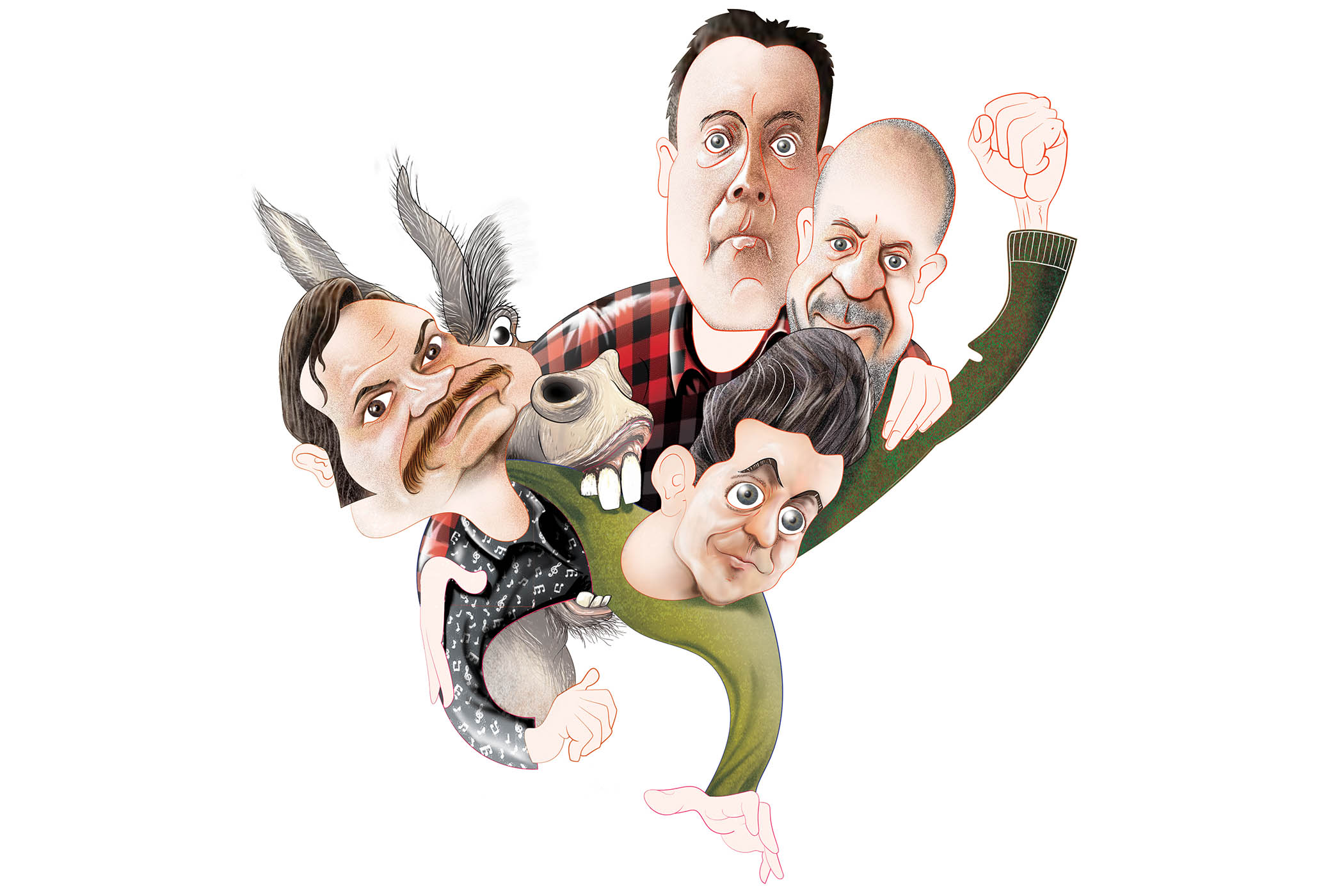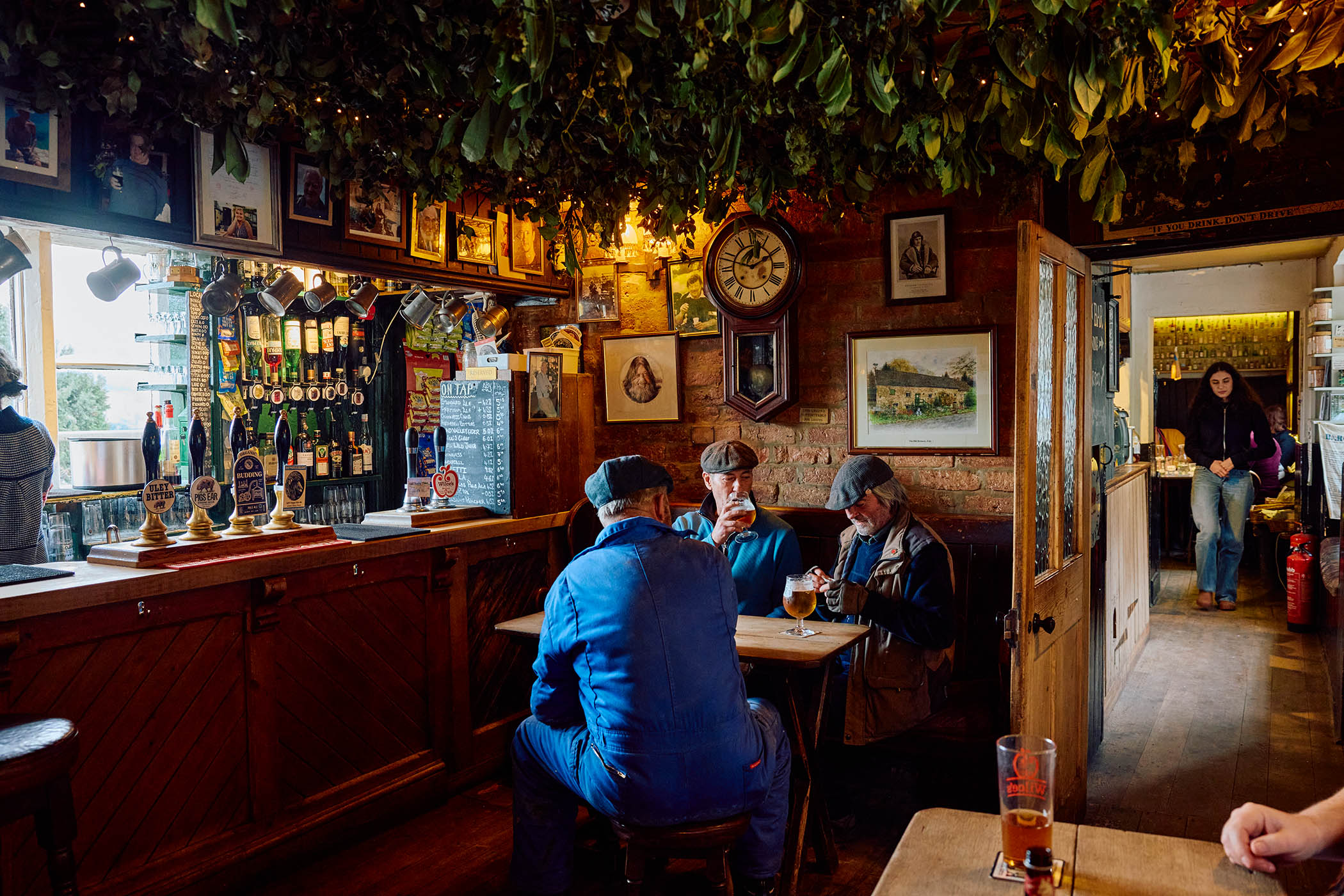Illustration by Andy Bunday
When members of the protest group Led By Donkeys projected images of Donald Trump and Jeffrey Epstein on to the walls of Windsor Castle last week, it swiftly led to four arrests on suspicion of malicious communication. That’s a crime that covers any indecent, grossly offensive, false or threatening communication for the purpose of causing distress or anxiety to the recipient.
Embarrassment, however, is not included in the Malicious Communications Act of 1988, and embarrassment is the protest group’s chief weapon of choice. That’s what the nine-minute film documenting the relationship between Trump and the late financier, convicted sex trafficker and paedophile was intended to do: embarrass the US president and his hosts, royal and governmental, during his state visit.
The four founding members of LDB are Ben Stewart (51), Ollie Knowles (50), Will Rose (46) and James Sadri (46). Although the identities of the arrested members have not been revealed, their age and locality profiles do not correspond to those of the founders, with the exception of Knowles.
For the past six years, they have devoted their creative energies to “interventions” that highlight political hypocrisy. They focus on the gap between words and deeds, reminding us of the staunch positions that have been quietly or expediently abandoned.
The group formed in early 2019, during that surreal period when the UK had checked out of the European Union but didn’t seem able to leave. The four men, who had met through Greenpeace, decided to express their frustration with the political mess unleashed by Brexit with a guerrilla billboard campaign featuring historical tweets by Brexit’s protagonists.
Operating anonymously, they gained a loyal following among Remain supporters, who helped crowdfund their exploits through capped donations. While images of the pre-referendum support of Jacob Rees-Mogg for a second vote or Nigel Farage distancing himself from the outcome were all part of the cut and thrust of a fractious time, it has to be said that a hard Brexit was the outcome and Boris Johnson, another LBD target, was elected with a huge majority.
The group’s name is derived from the phrase that described British troops in the first world war as lions led by donkeys. After Brexit was completed, their chief targets were Johnson, Liz Truss and Farage.
Related articles:
They continued to pursue Truss long after she left office, culminating in an intervention last year in which a banner featuring a lettuce and the words “I crashed the economy” were lowered behind the former prime minister during an interview on stage in Suffolk. It caused her to walk off and claim her freedom of speech had been infringed. The video has had more than 9 million views on YouTube, but some suggest it was a vindictive act against a woman without power – a criticism the group rejected.
Last year, after Reform achieved 14% of the vote in the general election, LBD described Farage as “a real person of interest to our project” and “Donkey number one”. Since then, he has featured regularly in its stunts and social media – and support for his party has doubled in the polls. Does this mean that while LBD’s exposés may entertain their followers, they have limited effect on their targets?
Newsletters
Choose the newsletters you want to receive
View more
For information about how The Observer protects your data, read our Privacy Policy
“The research seems to indicate that this kind of performative messaging helps to build solidarity but does nothing to convert,” says Charlie Beckett, professor of practice at the LSE’s department of media and communications. “I would suggest it generally puts off waverers because they see it as too smug, hostile and gimmicky.”
Later this month the Guardian columnist Zoe Williams will interview LBD on stage about their activism. Before she first met them, she saw the group as “too middle class, too comfortable, too successful” to be effective communicators of progressive politics. They looked, she says, “like people who listened to the Rest Is Politics podcasts and played football with each other.” But on learning of their past participation in risky protests, she realised this perception was her problem, not theirs. “They all met doing direct actions,” she says. “Two met in the North Sea in an action where you jump in front of a tanker and stay in the sea for hours.”
Stewart, a former head of media at Greenpeace UK and onetime Guardian Young Journalist of the Year, is, says Williams, “the edgy one”. Working as a press officer for the League Against Cruel Sports in the late 1990s, he met Knowles, a hunt saboteur who became an oceans campaigner with Greenpeace. Rose is from the north-east and lives in Scandinavia. He was a photographer for Greenpeace when he met the Iranian-born Sadri on the protest in the North Sea. Williams describes Sadri as the “nice one”.
He and Stewart both live in Bristol.
Stewart and Rose were two of the six activists who scaled the tower of Kingsnorth power station in 2007 in protest at plans to build a new gas-fired station. It was a daunting undertaking captured in a short film made by the documentarist Nick Broomfield. The six were arrested and sent to trial. The barrister hired to defend them was Keir Starmer, who stepped down when he was made director of public prosecutions just before the trial. But much of the defence he’d prepared was used and they were found not guilty – and as a political bonus gas-fired stations were discontinued. “He was fabulously great if you were an activist," Stewart said last year of Starmer.
That didn’t stop the group from projecting the prime minister’s face on to Wormwood Scrubs prison to highlight the imprisonment of peaceful protesters. The unavoidable irony is that Starmer – or the police operating under his government’s protest clampdown – has returned the compliment with the arrest of LBD members.
Paul Baines, professor of political marketing at the University of Leicester, argues that LBD is punching far above its size with its campaigns, and has achieved significant sociopolitical traction. “When you look at their social media following [a combined 2 million across Facebook, Instagram, YouTube and X], you start to realise they’re probably doing something right.”
According to Tom Edmonds, an election campaign practitioner and co-founder of the digital communications agency Edmonds Elder, social media is a misleading metric. “It creates a lot of retweets, a lot of engagement, a lot of hype online,” he says, “but they’re effectively going into a room of people who agree with them. They reflect what people in north London dinner parties talk about, which is not particularly useful in terms of changing the country.”
Prof Beckett believes there is utility in LBD’s approach. “Solidarity at a time of overwhelming threat to your world-view is probably the least you need,” he says.
The Windsor Castle escapade will doubtless raise spirits among supporters, not least for its impressive execution – projecting an in-focus film on to the walls of the UK’s most protected castle for nine minutes was no mean feat, requiring a mixture of clandestine preparation and technical know-how.
Yet the group see their work as an “accountancy project”, a reckoning with the guilty. In this respect Edmonds thinks it was a poorly conceived stunt, lacking power and wit. “There isn’t anyone in this country who doesn’t know there’s an association between Trump and Epstein,” he says. “But they haven’t crystallised that knowledge in the way that, say, Banksy is able to or, in party political terms, the way the Conservatives’ Labour Isn’t Working poster did.”
For Williams the projected film was a corrective to the cognitive dissonance of seeing someone who has been “credibly accused of sexual assault and rape” being honoured with full pomp and ceremony. “It stinks and we should know that.”
In the age of “clicktivism”, it’s not easy to gauge the deeper effects of such interventions beyond likes and retweets. While Prof Baines thinks these responses should not be underestimated, he believes what would really hammer home LBD’s message is if the four people arrested are charged.
But charged with what? Causing red faces? In these heavy-handed days of criminalising protest, it would be the kind of glaring error that Led By Donkeys would have a field day ridiculing. In other words, it would be an embarrassment.
Led by Donkeys
Born 2019
Alma mater Greenpeace
Work Activism



